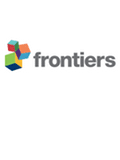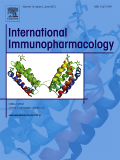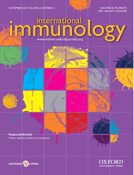
CLINICAL IMMUNOLOGY
Scope & Guideline
Empowering Research, Transforming Immunology
Introduction
Aims and Scopes
- Autoimmunity and Immune Dysregulation:
Research on the mechanisms underlying autoimmune diseases, including systemic lupus erythematosus, rheumatoid arthritis, and other immune dysregulatory disorders. This includes studies on the genetic, epigenetic, and environmental factors influencing autoimmunity. - Primary Immunodeficiencies:
Exploration of the genetic basis, clinical presentations, and therapeutic approaches for various inborn errors of immunity. This includes studies on novel mutations, their implications for diagnosis and treatment, and the development of clinical guidelines. - Translational Immunology:
Integration of basic immunological research with clinical applications, including the development of novel immunotherapies, vaccine responses, and therapeutic strategies for managing immune-related diseases. - Immuno-oncology:
Investigation of the immune system's role in cancer, including the mechanisms of immune evasion by tumors, the development of immunotherapies, and the identification of biomarkers predictive of treatment response. - Infectious Diseases and Immunity:
Studies focusing on the immune response to infectious agents, including the impact of viral infections (like SARS-CoV-2) on immune function and the role of vaccination in enhancing immunity. - Immunometabolism:
Research into the metabolic pathways that influence immune cell function and the implications of metabolic dysregulation in autoimmune and inflammatory diseases. - Biomarkers and Diagnostics:
Development and validation of biomarkers for disease activity, prognosis, and treatment response in various immunological disorders. - Clinical Trials and Therapeutics:
Reporting on clinical trials investigating new therapeutic agents, including monoclonal antibodies, small molecules, and cellular therapies aimed at modulating immune responses.
Trending and Emerging
- COVID-19 and Immune Response:
The pandemic has spurred a significant increase in research focused on the immune response to SARS-CoV-2, including studies on vaccine efficacy, post-viral syndromes, and the role of the immune system in disease severity. - Precision Medicine in Immunology:
An emerging focus on personalized approaches to immunotherapy and treatment for autoimmune diseases, with an emphasis on genetic and biomarker-based stratification of patients. - Long COVID and Immune Dysfunction:
Investigations into the long-term immune consequences of COVID-19, including persistent immune dysregulation and its clinical implications, have gained traction in recent publications. - Neuroimmunology:
Increased exploration of the interplay between the nervous system and immune responses, particularly in the context of autoimmune neurological disorders and neurodegenerative diseases. - Microbiome and Immunity:
Research on the relationship between the microbiome and immune system function is emerging, with studies exploring how microbiota composition influences autoimmune diseases and treatment responses. - Immunotherapy Advancements:
A growing trend in the exploration of novel immunotherapies, including bispecific antibodies, CAR-T cell therapies, and other innovative strategies targeting immune checkpoints.
Declining or Waning
- Traditional Vaccine Research:
Research focused solely on the efficacy and safety of traditional vaccines has decreased, likely due to the rapid development and deployment of mRNA vaccines and other novel platforms that have overshadowed conventional approaches. - Single Disease Focus Studies:
There has been a noticeable reduction in studies that concentrate exclusively on single disease models without considering the broader immunological context or comorbidities, reflecting a shift towards more integrative and holistic research approaches. - Basic Immunology Without Clinical Relevance:
Papers that present basic immunological findings without clear clinical implications have become less frequent, as the journal increasingly prioritizes studies with direct applications to patient care and treatment strategies. - Historical Perspectives on Immunology:
The publication of historical reviews or retrospective studies on immunology has waned, likely as the field moves towards more contemporary and forward-looking research that addresses current challenges.
Similar Journals

IMMUNOLOGY
Fostering Global Collaboration in ImmunologyIMMUNOLOGY is a premier journal published by Wiley that has been at the forefront of the field since its inception in 1958. With an impressive impact factor and classified in the Q1 quartile for both Immunology and Allergy as of 2023, this journal is highly regarded among researchers and professionals alike. It ranks 36th out of 233 in the Medicine/Immunology and Allergy category, and 40th out of 236 in the Immunology and Microbiology segment on Scopus, placing it firmly within the top percentile of its field. The journal is dedicated to publishing high-quality research that advances our understanding of immunological processes, bridging basic science with clinical applications. Although it does not operate under an open-access model, it offers conventional access options that remain integral to the dissemination of vital immunological research. With its broad scope and commitment to scholarly excellence, IMMUNOLOGY continues to serve as an essential resource for those seeking the latest advancements in immunology, fostering innovation and collaboration among scientists globally.

Frontiers in Immunology
Advancing Immunological Insights for a Healthier TomorrowFrontiers in Immunology is a leading open-access journal published by FRONTIERS MEDIA SA since 2010, dedicated to advancing knowledge in the field of immunology. With an impressive Q1 ranking in both Immunology and Allergy as of 2023, this journal exemplifies excellence in research dissemination, positioning itself among the top 22% of relevant literature in the discipline. The journal, based in Switzerland, emphasizes its commitment to open science by ensuring all published research is freely accessible, fostering collaboration and innovation among researchers, professionals, and students alike. With substantial visibility demonstrated by its ranks within the Scopus database—ranked #52 out of 233 in Immunology and Allergy, and #58 out of 236 in Immunology and Microbiology—Frontiers in Immunology serves as a vital platform for cutting-edge research. Researchers are invited to contribute original investigations and reviews that expand the understanding of immune mechanisms, therapeutic advancements, and clinical applications, making it a cornerstone for those looking to push the boundaries of immunological science.

Annual Review of Immunology
Setting the Standard for Scholarly Excellence in ImmunologyThe Annual Review of Immunology, published by Annual Reviews, is a premier journal that has been contributing to the field of immunology since its establishment in 1983. With a strong reputation highlighted by its impressive impact factor and top-tier rankings—holding the Q1 category in both Immunology and Immunology and Allergy, alongside significant Scopus Rankings—this journal serves as an essential resource for researchers, professionals, and students alike. The Annual Review of Immunology covers the latest advancements and critical developments in the domain, fostering a better understanding of immune responses and disorders. Although it is not an open-access journal, it provides comprehensive reviews that synthesize emerging data and trends, making it indispensable for those at the forefront of immunological research. With volumes anticipated through 2024, it continues to set the standard for high-quality scholarly publications in the field.

JOURNAL OF CLINICAL IMMUNOLOGY
Innovating Therapeutic Strategies for Immune HealthJOURNAL OF CLINICAL IMMUNOLOGY, published by SPRINGER/PLENUM PUBLISHERS, is a leading journal in the field of immunology, with an impressive standing as reflected in its Q1 ranking in both Immunology and Immunology and Allergy for 2023. With a history of publication dating back to 1981 and an E-ISSN of 1573-2592, this journal aims to disseminate cutting-edge research on diagnostic methods, therapeutic strategies, and understanding the mechanisms underlying immune responses. Its significant impact is underscored by its Scopus rankings, where it is placed in the top 15% of journals covering immunology and microbiology. The journal does not currently operate under an Open Access model, yet offers a robust platform for sharing essential findings that contribute to advancements in clinical immunology. As a resource for researchers, professionals, and students, the JOURNAL OF CLINICAL IMMUNOLOGY is pivotal in fostering dialogue and disseminating knowledge that enhances our understanding of immune-related diseases.

Immunotherapy Advances
Empowering breakthroughs in immunotherapy for global health solutions.Immunotherapy Advances, published by Oxford University Press, stands at the forefront of the rapidly evolving field of immunology and microbe interactions, focusing specifically on novel immunotherapeutic strategies and their clinical applications. Established in 2021, this peer-reviewed journal aims to disseminate high-quality research that contributes to the understanding and advancement of immunotherapeutic techniques, potentially transforming patient care in immunology. With a current Scopus rank of #140 out of 236 in the realm of Immunology, placing it in the 40th percentile, Immunotherapy Advances is positioned to be an integral resource for researchers, healthcare professionals, and students eager to stay updated with groundbreaking findings and methodologies. The journal is dedicated to fostering innovative discussions and collaborations, ensuring open access to vital research that influences treatment paradigms globally.

HUMAN IMMUNOLOGY
Championing Research in Allergy and ImmunologyHUMAN IMMUNOLOGY, published by Elsevier Science Inc, serves as a critical platform for disseminating research in the fields of immunology and allergy, as well as various aspects of miscellaneous medicine since its inception in 1980. With an ISSN of 0198-8859 and E-ISSN 1879-1166, this journal is pivotal for researchers and practitioners looking to advance their understanding of human immune responses and related conditions. The journal currently holds a respectable position within its field, as highlighted by its 2023 Scopus ranks—#114/233 in Immunology and Allergy and #132/236 in Immunology and Microbiology. Moreover, it maintains a Q2 quartile ranking in both Immunology and Allergy and miscellaneous Medicine, underscoring its influence and reach within the scientific community. Although it does not currently offer Open Access options, HUMAN IMMUNOLOGY remains dedicated to providing valuable insights and fostering academic discourse within its discipline, characterized by a rigorous peer-review process and a focus on innovative research trajectories.

International Immunopharmacology
Connecting Researchers to the Future of Immune System ScienceInternational Immunopharmacology, published by Elsevier, stands as a prominent journal within the disciplines of immunology and pharmacology. With an ISSN of 1567-5769 and an E-ISSN of 1878-1705, this esteemed journal is based in the Netherlands and features a robust commitment to disseminating high-quality research from its inception in 2001 through 2024. The journal has achieved impressive rankings, securing a Q1 category in Pharmacology and Q2 in both Immunology and Immunology and Allergy as of 2023. With its strategic focus on bridging the gap between immunology and pharmacological applications, International Immunopharmacology attracts a diverse readership, including researchers, healthcare professionals, and students interested in the latest advancements in therapeutic agents and immune system modulation. Furthermore, it offers an open access option, enhancing the accessibility and reach of its invaluable content. As a pivotal resource in the field, this journal not only facilitates the exchange of innovative ideas but also fosters a deeper understanding of the complexities of immunopharmacology in today’s research landscape.

INTERNATIONAL IMMUNOLOGY
Unveiling Innovations in Immunology for Global Impact.INTERNATIONAL IMMUNOLOGY, published by OXFORD UNIV PRESS, stands out as a premier journal in the field of immunology, providing a vital platform for disseminating groundbreaking research and innovative developments within the discipline. With an impressive Q1 ranking in Immunology and Allergy, as well as in Medicine (miscellaneous), it consistently showcases high-impact studies that contribute to the advancement of immunological knowledge. The journal spans over three decades, from its inception in 1989 to its ongoing contributions as of 2024, thus solidifying its reputation in the scientific community. Researchers, professionals, and students will find valuable articles that delve into the complexities of immune responses, therapeutic interventions, and emerging immunological paradigms, ensuring INTERNATIONAL IMMUNOLOGY remains at the forefront of knowledge in the life sciences.

NATURE IMMUNOLOGY
Exploring the intricacies of the immune system for a healthier tomorrow.NATURE IMMUNOLOGY is a premier academic journal published by NATURE PORTFOLIO, dedicated to advancing the field of immunology. With an impressive impact factor that reflects its esteemed position, this journal ranks in the top quartile (Q1) of renowned categories, including Immunology and Allergy. Serving as a crucial platform for researchers, professionals, and students, NATURE IMMUNOLOGY showcases cutting-edge research, comprehensive reviews, and insightful perspectives that drive innovation in immunological science. Based in the United Kingdom, this journal has been a vital contributor to the global discourse on immune responses and related diseases since its inception in 2000. Researchers can benefit from its rigorous peer-review process, ensuring that only high-quality studies are disseminated, thus enhancing their academic pursuits and practical applications. Explore the latest findings and trends within this flourishing discipline, making NATURE IMMUNOLOGY an essential resource for anyone engaged in the study of the immune system.

Autoimmune Diseases
Advancing understanding in autoimmune research.Autoimmune Diseases is a leading open-access journal published by Hindawi Ltd, dedicated to advancing the understanding and treatment of autoimmune disorders. Since its inception in 2010, this journal has provided a vital platform for researchers, clinicians, and students to share innovative findings and insights from the field of immunology. With an impressive Scopus ranking that highlights its relevance, particularly in the areas of Immunology and Microbiology and Immunology and Allergy, Autoimmune Diseases occupies a key position in the scientific discourse, ranking in the top quartiles across various categories. Researchers publishing in this journal benefit from a wide audience and high visibility, reflecting the increasing importance of understanding autoimmune diseases in today’s health landscape. Accessible to all, the journal promotes collaborative research and discussion, making it an essential resource for anyone dedicated to the study and management of autoimmune conditions.